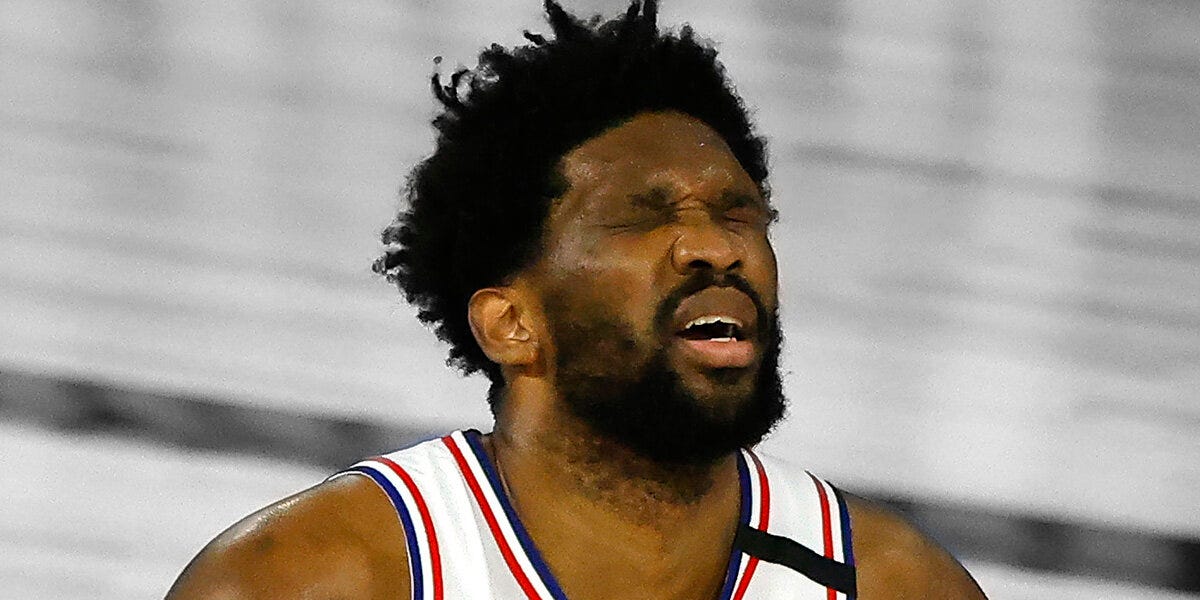What Does This All Mean For Joel Embiid as the Sixers' Best Player?
Maybe the big guy shouldn’t be the first guy on offense.
Andrew Unterberger is a famous writer who invented the nickname 'Sauce Castillo' and is now writing for The Rights To Ricky Sanchez, as part of the 'If Not, Pick Will Convey As Two Second-Rounders' section of the site. You can follow Andrew on Twitter @AUGetoffmygold and can also read him at Billboard.
Andrew's writing is brought to you by Kinetic Skateboarding! Not only the Ricky's approved skate shop, but the best place to get Chucks, Vans, any apparel. Use code "DAVESILVER" for 9.1% off your order.
A trendy and tempting thing for Sixers fans (including myself) to do since Ben Simmons went down during the Bubble Restart is to fantasize about the team playing a one-in, four-out offensive style -- in an attempt to maximize their offensive spacing, both for their shooters and for their big man -- with the 2009 Orlando Magic as the most common reference point. The idea has been laughed off by Brett Brown himself for conceptual reasons, likely in large part because (as Spike pointed out on the pod after Game Two) our four-out options are pretty putrid. Though they weren't superstars, that Magic team had a very talented perimeter cast, with far more shooting, playmaking and versatility than this current Sixers roster -- any of '09 Jameer Nelson, Hedo Turkoglu or Rashard Lewis would instantly slot in as our second-best offensive player right now.
But while the comparison obviously doesn't hold water, the idea that we thought to make it becomes a little chilling when you think about it from the other side of the equation. Wait a minute -- does this mean we're admitting that Joel Embiid is really just Dwight Howard? If so, that would certainly help explain why we’re currently down 3-0 to the Boston Celtics in this first-round series, shooting under 30% from the field as a team last night in Game Three with our season on the line. It would also suggest that running our offense through Embiid was not only never going to get us past Boston, but probably isn’t a particularly smart gameplan for this team moving forward in general.
Now, that’s not really fair to Joel — and to be honest, it’s not even totally fair to Dwight Howard. In 2009, a comparison to Dwight wouldn't have necessarily seemed diminutive. At that point, he was an athletic marvel good for 21 and 14 and DPOY-caliber defense every year, anchoring a perennial playoff contender and still just 23 years old. Orlando went to the finals that year with Dwight as their leading regular-season scorer and unquestioned best player. But even then, it was becoming increasingly clear that the center wasn't really an offensive hub like past dominant bigs: Aside from a signature 40-point closeout performance against Cleveland in the conference finals, he didn't score over 30 or dish more than four assists in any of the Magic's final 18 games that postseason, and the late-game heroics were mostly reserved for Lewis and Turkoglu. As Dwight's career went on and his post game and general offensive awareness failed to develop much further -- while NBA offenses drifted farther and farther away from the low block -- his offensive game became something of an NBA punchline, something teams begrudgingly indulged him in a couple possessions a game on just to ensure he'd engage on D.
Suffice to say, I don't think that's the fate we wanted from Joel Embiid. And by just about any measure, it was something he was beyond from a very early age: Embiid was already matching Dwight's career highs by his second season, with greater range, skill, intelligence and adaptability than D-12 ever showed in his NBA career. We hoped Embiid could be closer to the contemporary version of Howard's big man precursor in Orlando -- the original Superman, and the one who never let Dwight forget how much distance existed between them. We hoped he could be the rejoinder to the current belief that it was archaic to run an offense from the inside out in 2020 -- and if we had any hope for this current series against the Celtics, it was that Embiid would be able to dial it up like we've never seen before, and mount a six- or seven-game crusade for the big man's continued relevance as a first scoring option in the modern Association.
So what have the results been? Well, so far he's averaged 30 and 13 on about 61% True Shooting, getting to the line about 14 times a game and turning it over a little under four times a night. Those are, by nearly any estimation, very good numbers -- much better than his previous playoff averages and most of his regular-season stats certainly, and by far the most efficient and prolific production to be found on the Sixers in this particular series. If you were drawing up a list of the ten biggest reasons the Sixers are now one game away from getting swept by the Celtics, you couldn't really put his offensive output on it.
Then again, maybe you could. Perhaps even kinda high. Maybe at the top? Because as good as Joel has been, and as good as 30 and 13 are as averages and as much as 14 free throw attempts a game suggests he's doing it the right way... the offense has stunk, and the team is 0-3. Obviously a lot of that goes to Al Horford and Tobias Harris for collectively deciding no, it's the threes that are wrong, to Alec Burks for disappearing and Matisse Thybulle for being exposed, to Furkan Korkmaz for seemingly spending the entire series continually trying to unpop his ears, to Shake Milton for falling off the boat and getting eaten by sharks every four or five positions, to J-Rich attempting playmaking like he gets three tries at a possession before officially receiving a failing grade.
But a lot of it is just Embiid. He plods. He deliberates. He pump-fakes. He dribbles dangerously high and loose. He fails to anticipate where the help defense is coming from. He tries to get in position and runs into a teammate. He flails for a bailout call that may or may not come. He waits a half-second too long to kick the ball out and then rifles the pass a touch too hard, a smidge too wide. He's still good and productive and gets his numbers, but he doesn't make things much easier on his struggling teammates in the process -- who miss even on most of his good kickout passes anyway -- and he never really gives his team an offensive identity. He'd have to score 40 a night, at least, for it to be an effective strategy.
Maybe going into this series, we thought that 40 a night (or that kind of general indomitability) was actually within reach for Joel Embiid against the undersized Celtics. It's not like he's never scored like that before -- most recently he put up 41 against Indiana in the proper Bubble Restart opener -- and with there being a will for him to do so consistently, with Ben Simmons hurt, and with Daniel Theis and Enes Kanter his primary matchups, perhaps there would also be a way. But it's increasingly clear that Embiid lacks the true power or finesse -- or ability to think and act the game faster than the defense -- to make a smart playoff team feel small that consistently; there are too many weaknesses in his offensive approach to exploit, particularly when the rest of his team isn't hitting shots or otherwise providing much of a threat regardless. Like I asked him to, Joel's showed us what he's got, and it's just not enough right now.
What does that mean, then? Well, it certainly means we're not going to win this series, and probably won't take a single game in it, for one. The former point at least was cemented last night, when after a dominant offensive first half for Embiid (and a strong defensive game for the team throughout), Jo struggled for most of the final 24, and the team fell apart in the closing minutes thanks largely to two consecutive futile Joel post-ups, one where he threw the ball away and where we he tried in vain to draw a foul. Now we may need to get Furkan drunk before Game Four and try to convince him that he's actually TJ McConnell if we're gonna have any chance of avoiding being swept.
Again, tough to make Jo the scapegoat here when he still put up 30, and when his 7/20 night from the field (35%) was still somehow THE HIGHEST SHOOTING PERCENTAGE OF ANY SIXER LAST NIGHT -- and I did think he actually got fouled on that late possession. But at the risk of sounding David Byrne-level talking head-y.... these are the games where league's greatest stars drag their team over the finish line. Embiid's had a number of chances to be That Guy in close playoff games for the Sixers over the last three postseasons, and the results just haven't been there. He's still young, sure, and the book is far from closed on him as a high-level NBA player -- but he ain't that young no more. He'll be 27 by next year's playoffs, most of the way through his second contract, and with an AARP member's lifetime of lower-body trauma suffered. The window for him to plausibly become That Guy is already closing.
This is why, for the first time since Ben Simmons' rookie year, I have started to mentally entertain the idea of splitting up him and Embiid sooner rather than later. Not saying I'd actually do it, but MOC's proposal for the Sixers to at least start listening to phone calls on the matter is probably a prudent one. (Please don't fucking trade Jo for Bam Adebayo and Duncan Robinson though, oh post-process overlords.) I'd pooh-poohed so much concern trolling about their on-court fit that I'd never given proper credence to the notion that it would be tough to win at the highest level with the two of them simply because neither could really be your go-to offensive player when the games matter -- not just in a "who do you give the ball to down the stretch?" sense, but in a "who do you trust to run your offense through for 36 out of 48 minutes a night?" sense.
There was a time when the Sixers had the assets to get that third guy, and a time when they actually made a few swings to get that third guy. They thought that Markelle Fultz could be that guy, and they were proven wrong. They thought that Jimmy Butler could be that guy, and they were proven right, but wrong in enough other related calculations that it ultimately didn't matter. Maybe they thought that Tobias Harris could be that guy, but that was always dumb and only looks 100 times dumber now that he's averaging 14 a game on a cool 33% shooting (0% from three) in this series. Now, it is almost certainly too late to still get that guy. Pile together all our remaining quality assets -- Matisse, Shake, J-Rich, Zhaire, the OKC pick, other picks -- and it's probably still not enough to get that guy; not to mention I have no idea how we'd pay him when we already owe Harris and Horf the combined budget of the next two Avatar movies through 2024. The only way to get that guy at this point might be trading one of Simmons and Embiid.
I probably couldn't do it. I still love these guys too much; I hate myself for even thinking about them this way. A large part of me still wants to make excuses for Jo: Ben's out, he's getting no help, his team can't run an offense or space the floor for him, he needs the jolt of our home crowd, he needs a better coach, he needs a better front office, he needs one fully normal basketball season -- just give him another year and he'll figure it out. And if we were talking about Ben playing without Jo, I'd be doing the same thing. These are my guys forever, and I'd still rather lose with them than win with Jayson Tatum and Jaylen Brown.
But realistically, it's getting harder and harder to actually convince myself that you can win much in the 2020 NBA -- a league where nearly every relevant team has not just one, but multiple lights-out perimeter creators and shooters -- with your two best players being a point guard who won't hoist and a big man who has to grind it out down low. It's too much of a slog, it relies on too many things going right, it makes your margin for error so small on the other end for when some little punk like Kemba Walker comes down on the other end and effortlessly hits two pull-up threes to undo all the hard work you've done in the last five possessions in a matter of seconds. It's draining. It's demoralizing. It's unsustainable.
It’s not just Embiid. Anthony Davis and DeMarcus Cousins had such tough times dragging their respective teams to the playoffs that the Pelicans eventually paired them to see if that would help (it didn’t — at least not dramatically or quickly enough), and then both eventually left to play with LeBron James and Steph Curry, respectively. A stellar Nikola Jokic run couldn’t get the Nuggets past an injury-stricken Blazers team in the second round last year; this year the only game Denver has taken from Utah in the first round required a scorching late-game performance from Jamal Murray. The Timberwolves needed to import Jimmy Butler to even get Karl-Anthony Towns to the postseason, and they’ve been lottery bound since Jimmy forced his way out of Minnesota. We hoped Embiid was good enough to be the exception to this trend, but we may have underestimated just how otherworldly he’d have to be as a first-option big to escape it.
Maybe it's not fair to draw so much from this one series when I do believe that if we had Ben Simmons for it, we'd have won at least one of these games so far. As Zach Lowe said on the pod before the series, the only way for a team to win at the highest level while playing through the post is to pair it with truly suffocating defense -- and while the Sixers certainly haven't done that consistently this year, they have in stretches with Ben, and likely would have with him for parts of this series. (He also would've helped with our non-existent transition game, and in just being able to run our offense for the times when Shake was badly in need of a life preserver.) Brett said it in his pre-game speech last night -- win one game in a series and everything feels different.
But even without Simmons, I can't help feeling it's meaningful that we can't seem to win a game playing through Jo. We can make it easier for him, and we can improve the situation around him, but I don't know if we can change the fundamental facts about the player he is and the league he's playing in. Hell, maybe even Shaq would've struggled to anchor an offense in 2020. But he's not Shaq, regardless. That doesn't mean he's Dwight Howard, either. You just might be better off if you had the perimeter talent around him to utilize him a little more as if he was, letting him anchor your defense and score off pick and rolls and putbacks, and occasionally giving him the ball to go to work -- but not trusting him to totally carry you offensively. A tough pill to swallow for sure, but one our front office (or whoever replaces them this summer) should work on choking down before trying to figure out this summer how we're going to save this team from total oblivion.






